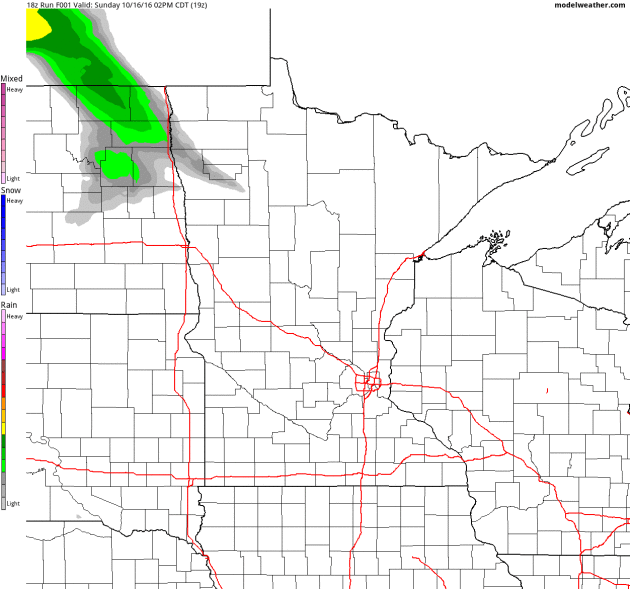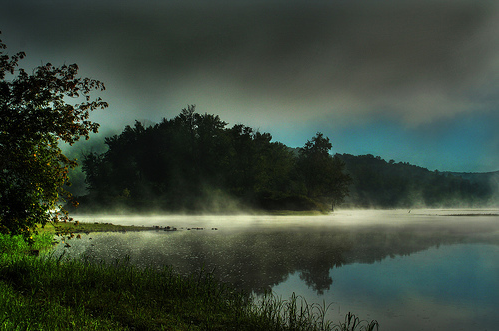57 F. average high on October 16.
47 F. high on October 16, 2015.
October 17, 1971: Heavy rain falls in NW Minnesota. 4.02 inches is recorded at Georgetown (20 miles N of Moorhead).
October 17, 1952: Record lows between 10 to 15 degrees are reported across central Minnesota, including a low of 10 at St. Cloud, 12 at Glenwood, and 14 at Alexandria, Litchfield, and Mora.
Limping Into Autumn - No Weather Drama Brewing
The questions are benign, the weather almost an afterthought. "When will fall color peak?" "What time will the showers arrive?" "Is this next cool front jacket-worthy?"
Mother Nature is blowing us all a kiss, compared to Octobers gone by. On this date in 1880 western Minnesota was digging out from a severe blizzard that temporarily shut down the railroads. On October 17, 1952 St. Cloud awoke to 10 degrees.
You know, back when it actually snowed in October.
Yesterday was a fine spring day; my neighbor mowing a supernaturally-green lawn. No official frost yet, but mosquitoes are living on borrowed time.
A nearby frontal boundary ignites a few T-showers today as temperatures approach 70F in the MSP metro. We cool back down into the 50s by late week, but no obnoxiously cold air is on tap anytime soon.
The pattern doesn't favor big, burly, full-latitude storms capable of high winds, heavy rain or snow. A "zonal", west to east flow aloft should mean rapid changes and light rain showers.
The lowest mile of the atmosphere will be too warm for snow through at least Halloween.

Image credit: Capital Weather Gang, which has more astonishing, heartbreaking imagery from the thousand-year flood that hit North Carolina.
Hurricane Matthew Brought 1,000 Year Record Rainstorms to North Carolina. This would be the 6th thousand-year flood to strike the USA since October of 2015 (Texas, South Carolina, West Virginia, Maryland, Louisiana - now North Carolina). Here's an excerpt from Pacific Standard: "The storm swept in by Hurricane Matthew has produced rainfall that exceeds the level expected about once every 1,000 years, according to a statistical analysis using National Oceanic and Atmospheric Administration data. Matthew broke numerous rainfall records in some of North Carolina’s toughest-hit towns, marking another spike in this year’s extreme weather. The new rainfall records were enabled by warming in the ocean and coastal atmospheres, which hold more water as temperatures increase — with a few cities across the Southeast reporting record levels of air moisture during the storm..." (October 6 file image: NOAA and AerisWeather).
Photo credit: "Floods surround houses in Vietnam’s Ha Tinh province after torrential rain submerged tens of thousands of houses." Photograph: STR/EPA.

State Regulators Approve Xcel's Plan to Shut Down Becker Coal-Fired Plants. The Star Tribune reports: "Minnesota
utility regulators Thursday approved Xcel Energy’s plans to shut down
its big coal-fired generators in Becker, Minn., by 2026, a move that
will eventually eliminate the state’s largest emitter of greenhouse
gases. They also directed Xcel to submit a plan for replacing a big
chunk of that lost coal generation at its Sherco plant. But the Public
Utilities Commission (PUC) didn’t approve Xcel’s solution of building a
large gas-powered generation plant on the Sherco site, a partial power
replacement. Essentially, the PUC asked Xcel to look more closely at
renewable energy alternatives — along with the gas plant — to help
compensate for the loss of the Sherco coal plants..."
One Day, Cars Will Connect With Your Fridge and Your Heartbeat. Here's a snippet of a fascinating article at The New York Times: "...The
next generation, he said, will focus on managing our entire digital
lives, aided by semiautonomous systems that assume more responsibility
for actual driving tasks. “Once we get to the world of autonomous
driving, these cars are not going to be about horsepower but about the
in-vehicle experience and how it’s connected to your lifestyle,” Mr.
Moinzadeh said. “The car will talk to all your connected things, whether
it’s your refrigerator or your home security system...”
Photo credit: "Connected Car services become contextual to the driver’s location and lifestyle." Credit Syda Productions.
Photo credit: "New England Patriots quarterback Tom Brady fakes a hand off during an NFL football game against the Cleveland Browns, Sunday, Oct. 9, 2016, in Cleveland. New England won 33-13." (David Richard/AP).

TODAY: Lot's of clouds, few showers & T-showers, mild. Winds: NE 5-10. High: near 70
MONDAY NIGHT: Showers taper, cooling down. Low: 52
TUESDAY: Partly sunny and drier. Winds: W 8-13. High: 64
WEDNESDAY: Mix of clouds and sun, seasonable. Winds: NW 8-13. Wake-up: 46. High: 59
THURSDAY: Partly sunny, oddly October-like. Winds: NW 8-13. Wake-up: 42. High: 53
FRIDAY: Clouds increase, few showers up north. Winds: SE 10-15. Wake-up: 36. High: 57
SATURDAY: Intervals of sun, not bad at all. Winds: W 7-12. Wake-up: 44. High: 60
SUNDAY: Early shower, then slow clearing. Winds: N 5-10. Wake-up: 47. High: 55
Climate Stories....
Nations, Fighting Powerful Refrigerant That Warms Planet, Reach Landmark Deal. It is a big deal, and more evidence that things can get done. Here's an excerpt from The New York Times: "Negotiators from more than 170 countries on Saturday reached a legally binding accord to counter climate change
by cutting the worldwide use of a powerful planet-warming chemical used
in air-conditioners and refrigerators. The talks in Kigali, the capital
of Rwanda, did not draw the same spotlight as the climate change accord
forged in Paris last year. But the outcome could have an equal or even
greater impact on efforts to slow the heating of the planet. President
Obama called the deal “an ambitious and far-reaching solution to this
looming crisis...”
How the Chemical Industry Joined the Fight Against Climate Change. Good for Honeywell and Dupont. The New York Times has more perspective and context.
Historic Shrinking of Antarctic Ice Sheet Linked to CO2 Spike. Climate Nexus reports: "Twenty-three
million years ago, the Antarctic Ice Sheet began to shrink, going from
an expanse larger than today’s to one about half its modern size.
Computer models suggested a spike in carbon dioxide levels as the cause,
but the evidence was elusive — until now. Ancient fossilized leaves
retrieved from a lake bed in New Zealand now show for the first time
that carbon dioxide levels increased dramatically over a relatively
short period of time as the ice sheet began to deteriorate. The
findings, appearing in the journal Earth and Planetary Science Letters,
raise new questions about the stability of the Antarctic Ice Sheet
today as atmospheric CO2 concentrations rise to levels never before
experienced by humans..." (Image: Pexels).
Scientists Warn Negative Emissions Are a "Moral Hazard". Will we ever be able to (cost-effectively) suck CO2 out of the air to slow the global warming trend? Perhaps - but can we count on it? Here's an excerpt from Climate Central: "Removing carbon dioxide emissions from the atmosphere to prevent global warming from becoming catastrophic may be a fool’s game amounting to a “moral hazard par excellence,” according to a paper published Thursday in the journal Science. Nobody knows if atmospheric carbon removal — known as negative emissions — will work, and it could delay critical cuts to emissions while tacitly giving people license to pollute, the paper says..." (File image: NASA).
Here's Why Many Young Voters See Climate Change as THE Issue in 2016. Public Radio International has the story: "...Climate change has intensified the drought in California, which has left many wells in California’s agricultural Central Valley without water.
Communities vulnerable to flooding have the opposite problem, as we saw
in Louisiana last month when 7.1 trillion gallons of rain fell in one
week. Worldwide, average temperature records are broken month after
month, with increasingly adverse effects the world over. And rising sea
levels are already causing more destructive and dangerous storm surges,
as we witnessed with Hurricane Matthew last week. Climate change will
affect my career, my family, my community, my everything. For my
generation, millennials, it is so much more than the “environmental”
issue previous generations understood it to be..."
No comments:
Post a Comment